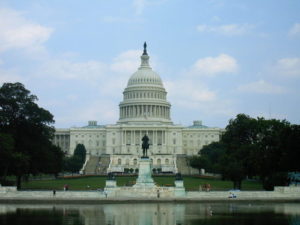 It is unlikely that any of us is unaware that this is a Presidential Election year. We are faced with a choice, and as citizens, we have the privilege of voting for one or the other. One of these two major party candidates will likely succeed the President, who is currently completing his final term of office. This is the American way of transferring executive authority from one to the next. And the following thoughts on praying for those in authority are directed firstly…at myself.
It is unlikely that any of us is unaware that this is a Presidential Election year. We are faced with a choice, and as citizens, we have the privilege of voting for one or the other. One of these two major party candidates will likely succeed the President, who is currently completing his final term of office. This is the American way of transferring executive authority from one to the next. And the following thoughts on praying for those in authority are directed firstly…at myself.
Paul told Timothy that we should pray publicly for those who are in authority (and, I would take it, also for those who are seeking election to offices of authority). He said in I Timothy 2:1-3, “First of all, then, I urge that entreaties and prayers, petitions and thanksgivings, be made on behalf of all men, for kings and all who are in authority, so that we may lead a tranquil and quiet life in all godliness and dignity. This is good and acceptable in the sight of God our Savior.” This is an all-encompassing instruction – all means all. Praying for all those in authority is commanded by God. And Paul said that we should do this “first of all”. He indicated that this is of primary importance in the local church. In our public worship, as well as in our private prayers, we should pray for those who are in authority. Why? Warren Wiersbe in his little book titled “Something Happens When Churches Pray” suggests three reasons.
 First of all, we must pray for them for their sakes. They need God’s help. They are simply humans in places of authority, men and women who are sinners and have weaknesses – clay vessels chosen by God to perform a certain task, play a particular role, and serve a specific purpose. I don’t believe we have the right to criticize or judge someone who is in a place of authority unless we have really prayed for that person. (Ouch!)
First of all, we must pray for them for their sakes. They need God’s help. They are simply humans in places of authority, men and women who are sinners and have weaknesses – clay vessels chosen by God to perform a certain task, play a particular role, and serve a specific purpose. I don’t believe we have the right to criticize or judge someone who is in a place of authority unless we have really prayed for that person. (Ouch!)
We must pray for them because they are ministers. We read in Romans 13:1-4: “Every person is to be in subjection to the governing authorities. For there is no authority except from God, and those which exist are established by God. Therefore, whoever resists authority has opposed the ordinance of God; and they who have opposed will receive condemnation upon themselves. For rulers are not a cause of fear for good behavior, but for evil. Do you want to have no fear of authority? Do what is good and you will have praise from the same; for it is a minister of God to you for good. But if you do what is evil, be afraid; for it does not bear the sword for nothing; for it is a minister of God, an avenger who brings wrath on the one who practices evil.” Do you ever stop to think when you see a policeman that he is a minister of God? Or consider the President or any other on a long list of leaders a minister of God?
Can God work through people in places of authority who are not consecrated Christians? Proverbs 21:1 says, “The king’s heart is like channels of water in the hand of the Lord; He turns it wherever He wishes.” Who really decides who occupies places of human authority? The prophet Daniel tells us in 2:21a, “It is He (God) who changes the times and the epochs; He removes kings and establishes kings…” And sometimes God gives us the leaders we really deserve. Daniel spoke to this when he said in 4:17b, “…that the Most High is ruler over the realm of mankind, and bestows it on whom He wishes and sets over it the lowliest (“basest” in KJV) of men.” We tend to hold such a low view of the sovereignty of God that we really don’t believe that, when we pray for people in authority, God can work. But Andrew Murry said, “God rules the world by the prayers of His saints.”
Someone may say, “But wait just a minute; some of these people persecute Christians!” That’s right, but even that doesn’t exempt us from praying for them. How did Stephen pray as they hatefully stoned him to death? “Lord, do not hold this sin against them!” You may not agree with the party or even like the leader, but you have to respect the government. And even before they persecute us, we are supposed to pray for them. “But I say to you, love your enemies, and pray for those who persecute you.” (Matthew 5:44)
In the church that you attend, does somebody stand up at least once during the public worship service and pray for those in authority? That’s the way to get laws passed that ought to be passed. That’s the way to have laws acted upon and godly principles established in a government.
Second, we must pray for them for the church’s sake, “…so that we may lead a tranquil and quiet life in all godliness and dignity. This is good and acceptable in the sight of God our Savior.” Outward tranquility and inward quiet or peace are the predictable results of such prayer. Godliness and dignity will mark the life of such a one. If I am really praying for those in authority, I will live a respectable, honest, honorable, godly life. I will be a peacemaker, and not a trouble-maker. And I will trust the Lord when conflict happens. “Never pay back evil for evil to anyone. Respect what is right in the sight of all men. If possible, so far as it depends on you, be at peace with all men. Never take your own revenge, beloved, but leave room for the wrath of God, for it is written, “Vengeance is Mine, I will repay,” says the Lord.” (Romans 12:17-19)
I don’t believe it dignifies or honors the Lord when Christians with loud mouths and mean attitudes attack officials in an unchristian way. I don’t think it pleases the Lord.
So, we must pray for those in authority for their sakes, and for the church’s sake, and thirdly, we must pray for those in authority for the sake of lost sinners. We pray so that God might be able to work through government to give us the opportunity to win the lost. We must pray that the authorities who are in office might be able to keep life safe and free. We must pray that God will continue to keep the doors open for all forms of gospel witness.
Here is how Watchman Nee put this. “In relation to earthly nations and events, the supreme question to ask ourselves is always, how is the Church of God affected? This should be the direction of all our prayers with regard to world governments – not for or against one side or another, in politics or war, but for the will of God. If all history is in relation to the Lord’s testimony, then we must know how to pray. It must be possible for British and German, Chinese and Japanese Christians to kneel together and pray together, and all say Amen. Our one appeal to God must be for a march of events that is of advantage to the testimony of His Son. “
But instead of that, we try politics. We try lobbying. We try everything we can to change people’s minds. We do everything but pray! Now nothing is wrong with Christians serving in government and trying to exercise godly influence in the corridors of power. Think of Daniel, Joseph, and Esther serving in pagan governments, and how God used them.
But Paul said we must – first of all – pray for those in authority. That’s the important thing. We must pray for their sake, because they are just people. But they are ministers of God, and God can use them and work through them in spite of themselves. We must pray for the church’s sake, that we might have the right circumstances for serving God. And we must pray for the sake of lost sinners, for if God allows governments to close the doors, then we will not be able to preach and share the Gospel with the lost.
Are you praying daily for those who are in authority? If we are not, we should start. Is your church praying regularly for those in authority? Something happens when churches pray for those in authority. That’s when God begins to work and accomplish His purposes.
– Ron Scarbrough (Elder)
